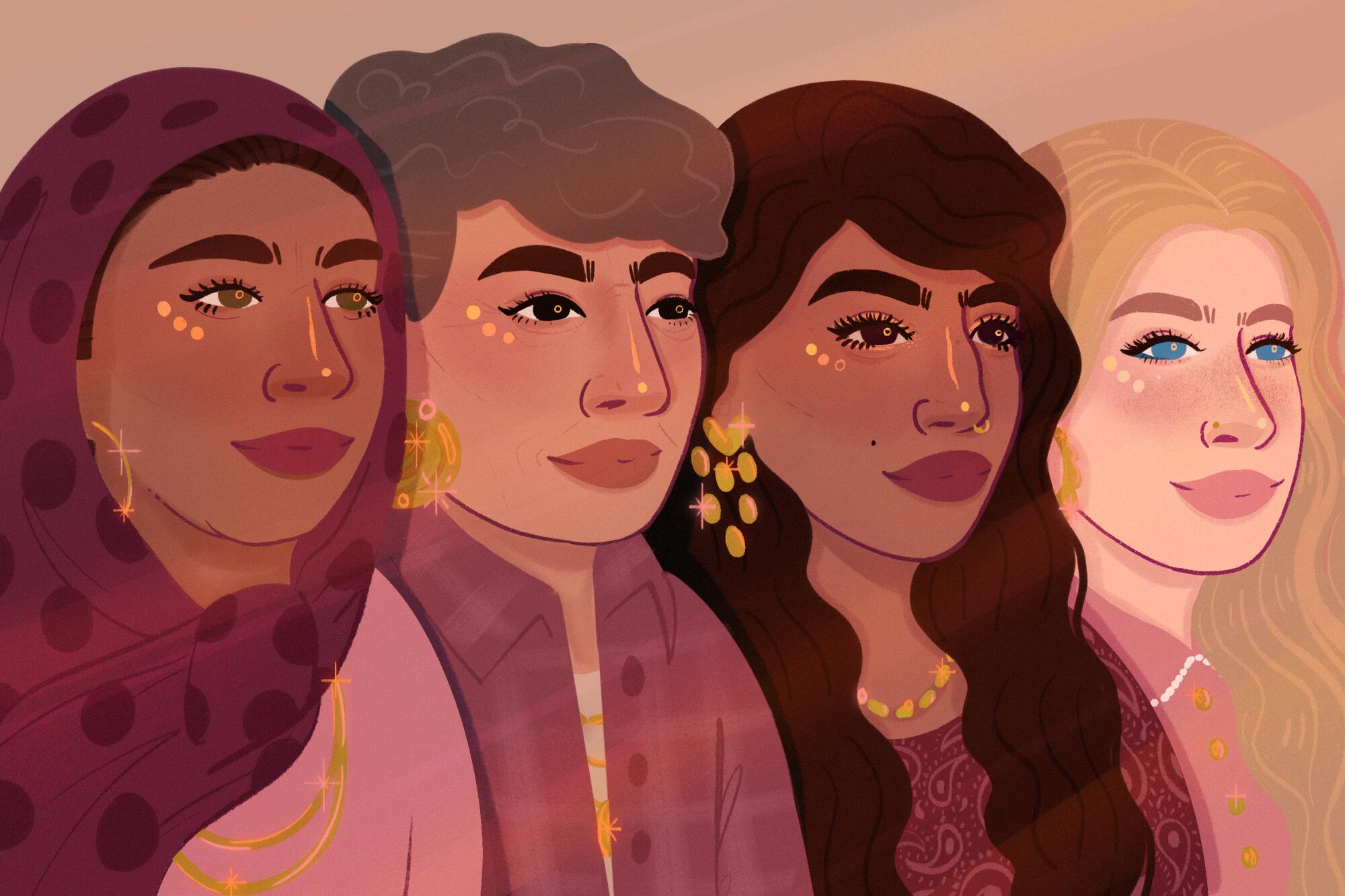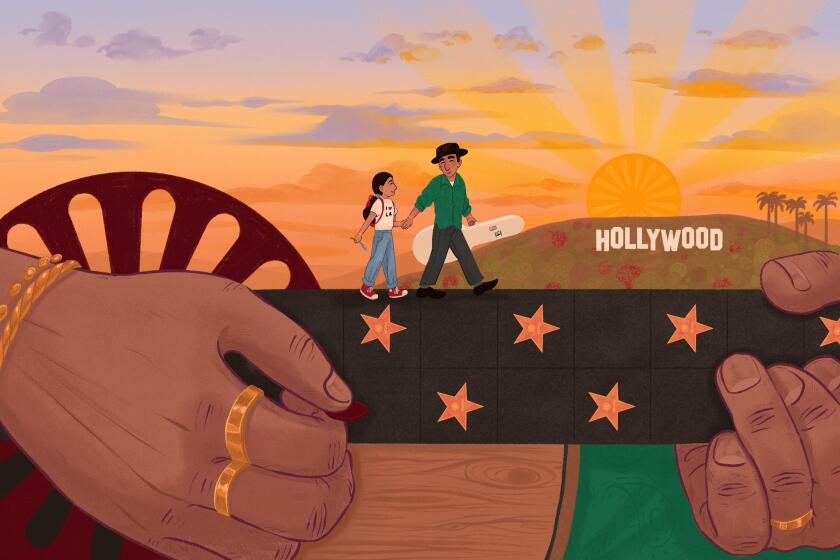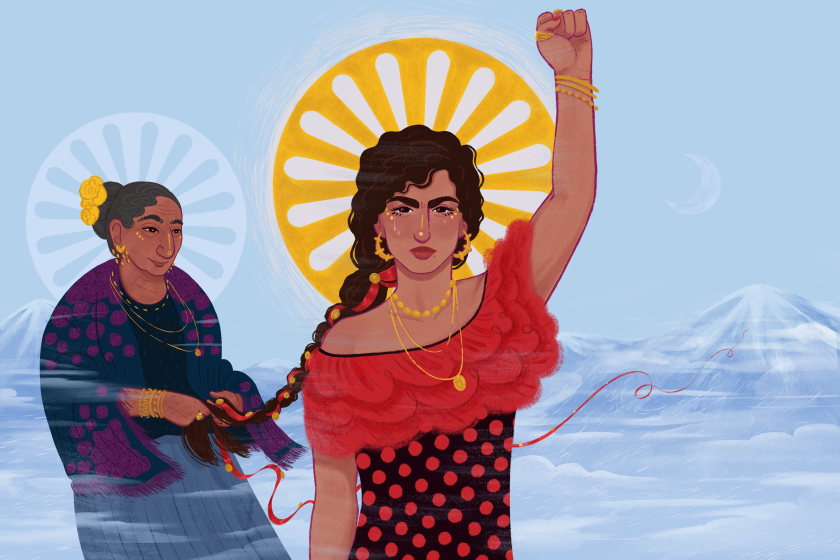
- Share via
I grew up along Romania’s Black Sea coast. My father was the first in his family to graduate from university, and my mother went to a vocational school. Being educated was unusual in our Romani community. My parents raised me with a deep sense of justice and dignity. They told me to be proud of being Roma, while non-Romani people told me there was something wrong with me.
My parents still preserved some aspects of traditional Romani culture: They were obsessed with me maintaining my virginity and being a “good woman.” In many Romani communities, women get married as teenagers. Those who attend school often drop out before high school because they get married, or to care for their younger siblings and perform household chores. Others leave school out of fear of the racism they would face.
Romani women aren’t a monolith. But we all contend with patriarchy and marginalization both inside our culture and from the outside world. The contradictions I have witnessed led me to ask questions and eventually, to discover feminism and to fight for equality. Along this path of activism, however, I learned that I had to define my own understanding of what it means to be a feminist within my Romani identity.
Growing up in Russia, my family wasn’t taught to be proud of our Romani roots. But the diversity of L.A.’s language and music changed us.
Romani people have endured centuries of injustice across Europe, as an ethnic minority, yet we have a long history of resistance. By the late 1990s, I had graduated from university, gotten married and become a mother. I was also an activist in the Romani movement. I started to wonder what elders meant when they said that we struggled for our “rights.” I learned about the discourse around the universality of human rights. As Romani people, did we really believe in human rights? Or did we only believe in human rights when it came to our rights, Romani people’s rights? What about everyone else? And who is in the position of power to define Romani rights? I debated these questions with my soul mate and fellow Romani activist, Nicolae Gheorghe.
At the same time, I began to question the condition of women and girls in our community, and why we were treated differently from the boys and men around us. Even when I joined the Romani rights movement, I was expected to behave in certain ways that men defined. They determined who was a “good” Romani woman activist. Some Romani male activists tried to monitor my sexuality and called me a “whore” when I had a relationship with a man when I wasn’t married. It was the verses of our beloved Polish Romani poet known as Papusza (whose real name was Bronislawa Wajs) that brought me comfort. She wrote about the Holocaust and of being a woman defying constraints and traditional roles for women, for which she was ostracized by the community. Where were women’s rights within the discussion of Romani rights?

This is part of an occasional series on Romani communities. Listen to the podcast at latimes.com/foretold.
Then came feminism. I met Debra Schultz the American Jewish historian, who could see all these questions burning inside me. She bought me the first books about feminism that I read, including works by thinkers such as Simone de Beauvoir. But I really fell in love with the work of Black feminists Angela Davis and bell hooks, whose book, “Ain’t I a Woman” became like a bible for me. And later, I met law professor Kimberlé Crenshaw, who introduced me to the concept of intersectionality between race and gender. Finally, the way I saw the surrounding world and my Roma world became clearer to me.
Feminism gave me the lens to question the world’s power dynamics, from private spaces to international politics. Despite this intellectual awakening, I still went on to face horrible racism when I met white feminists, who said they didn’t see the point of including Romani women in feminist agendas when there was already an existing Romani rights movement. When there was a spike in racism against Romani people in Europe around 2005-07, I reflected on how to practice a feminism that did not erase my Roma identity and that did not reinforce the oppression of my community.
Neither of the two social movements that I have moved between — feminism and Romani struggles — wanted Romani women’s concerns to be highlighted unless those in charge got to decide how to portray such issues. Every social movement has its prejudices, I learned.
I love Romani heritage and symbols of our unity, including our flag. But celebrating our history of resistance doesn’t mean erasing our unique individual identities.
So, what is Romani feminism? To me, it means I have the freedom to choose what version of a Romani woman I want to be. Romani feminism is the force that makes it possible for our communities to grow and to challenge others around us. Our feminism reminds us that the greater Romani movement should not only be about how to get into the structures of power, but how we should never forget the local communities, and the people. We should be close to our people at the local level, in their daily lives, while challenging both racism and sexism.
We Romani feminists reiterate pride in being Roma by constructing and reconstructing through archive, memory and art, the possibility for the next generation to practice a new identity, without the burden and control that our ancestors faced. Our work ranges from creating collaborations such as the Roma Women’s Initiative, a group of female Romani leaders across Europe, to providing social services to Romani women who continue to face harassment, racism and other challenges. We are creating our own ways to help each other.
Some may call me a pioneer, or a traitor for splintering the Romani rights movement. For others, I am not radical enough. But after three decades as a Romani feminist, I am still acting against “anti-gypsyism,” manifesting the love of my people, crying out loud with pain when I feel and see how others hate us.
Nicoleta Bitu is a Romani feminist activist and scholar based in London.
More to Read
A cure for the common opinion
Get thought-provoking perspectives with our weekly newsletter.
You may occasionally receive promotional content from the Los Angeles Times.












